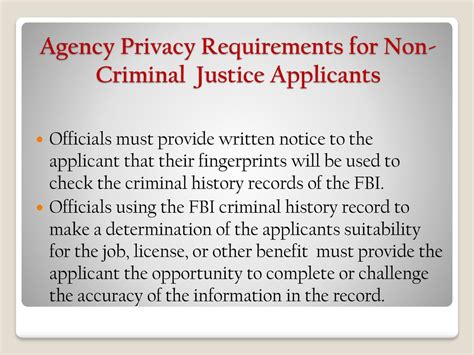In today's digital age, protecting one's privacy has become a pressing concern for individuals from all walks of life. For non-criminal applicants, who may be applying for jobs, loans, or other opportunities, maintaining confidentiality is crucial to avoid potential repercussions. In this article, we will explore five ways non-criminal applicants can protect their privacy and ensure their personal information remains secure.
Understanding the Importance of Privacy
Before we dive into the ways to protect privacy, it's essential to understand why it's crucial for non-criminal applicants. In today's society, a person's reputation and character can be easily tarnished by false or misleading information. For instance, a job applicant may be rejected due to an inaccurate background check, while a loan applicant may be denied due to a minor mistake on their credit report. By taking proactive steps to protect their privacy, non-criminal applicants can minimize the risk of such incidents occurring.
1. Monitor and Manage Online Presence
In today's digital age, it's easy for personal information to spread like wildfire online. Non-criminal applicants can protect their privacy by monitoring and managing their online presence. Here are a few steps to take:
- Google yourself: Regularly search for your name, initials, and any other identifying information to see what comes up.
- Set up Google Alerts: Create alerts to notify you whenever your name or other identifying information appears online.
- Review social media: Ensure your social media profiles are private, and remove any sensitive or compromising information.

2. Use Secure and Encrypted Communication Channels
When communicating with organizations or individuals, it's essential to use secure and encrypted channels to protect sensitive information. Here are a few tips:
- Use encrypted email services: Consider using email services like ProtonMail or Tutanota, which offer end-to-end encryption.
- Use secure messaging apps: Apps like Signal or WhatsApp offer end-to-end encryption, making them more secure than traditional messaging apps.
- Avoid public Wi-Fi: Refrain from using public Wi-Fi to transmit sensitive information, as it can be easily intercepted by hackers.
3. Be Cautious with Background Checks
Background checks can be a necessary evil for non-criminal applicants. However, it's essential to be cautious when undergoing these checks to ensure your privacy is protected. Here are a few tips:
- Understand the type of check: Know what type of background check is being conducted and what information will be accessed.
- Review the report: Carefully review the background check report to ensure there are no errors or inaccuracies.
- Dispute errors: If you find any errors or inaccuracies, dispute them immediately to avoid any potential repercussions.

4. Keep Sensitive Documents Secure
Non-criminal applicants often need to provide sensitive documents, such as identification or financial records, when applying for opportunities. It's essential to keep these documents secure to protect your privacy. Here are a few tips:
- Use a secure storage service: Consider using a secure storage service like Dropbox or Google Drive to store sensitive documents.
- Use a password manager: Use a password manager like LastPass or 1Password to generate and store unique, secure passwords.
- Shred unnecessary documents: Shred any unnecessary documents or papers that contain sensitive information.
5. Know Your Rights
Finally, non-criminal applicants should know their rights when it comes to protecting their privacy. Here are a few key rights to be aware of:
- The right to access: You have the right to access any information that's been collected about you.
- The right to correction: You have the right to correct any errors or inaccuracies in your personal information.
- The right to opt-out: You have the right to opt-out of data collection or sharing in certain circumstances.

Gallery of Privacy Tips





FAQs
What is the most effective way to protect my online presence?
+The most effective way to protect your online presence is to regularly monitor and manage your social media profiles, set up Google Alerts, and use secure and encrypted communication channels.
How can I ensure my background check is accurate?
+To ensure your background check is accurate, carefully review the report, dispute any errors or inaccuracies, and understand the type of check being conducted.
What are my rights when it comes to protecting my privacy?
+You have the right to access, correct, and opt-out of data collection or sharing in certain circumstances. It's essential to know your rights to protect your privacy effectively.
By following these five ways to protect their privacy, non-criminal applicants can minimize the risk of their personal information being compromised and ensure they maintain their confidentiality. Remember to stay vigilant, monitor your online presence, and know your rights to protect your privacy effectively.
